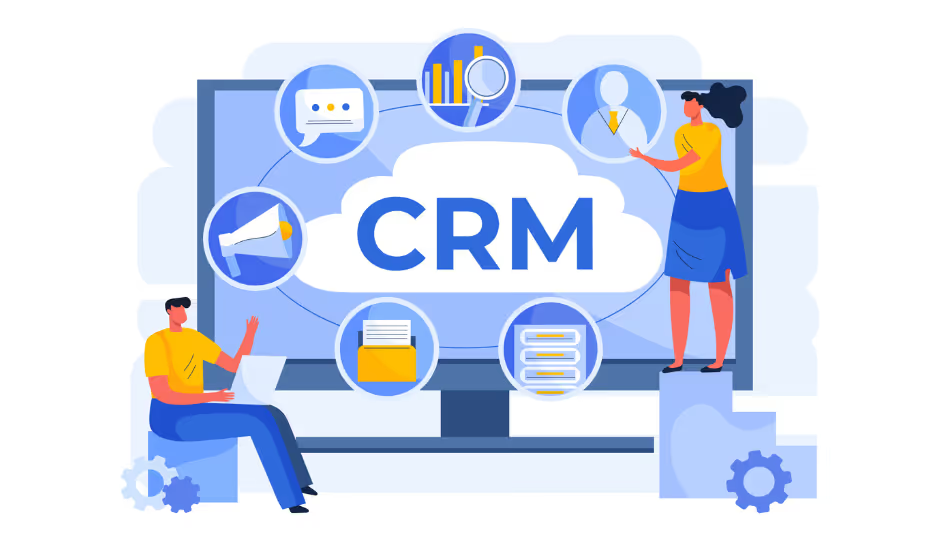
Delivering a great customer experience has become one of the most important business goals today. Customers expect quick responses, personalized service, and seamless interactions across all channels. To meet these expectations, companies are increasingly turning to CRM solutions that not only manage customer data but also enhance engagement at every stage of the journey.
What Is CRM and Why It Matters for Customer Experience?
A Customer Relationship Management (CRM) system is designed to centralize and organize customer information, track interactions, and improve service delivery. When integrated effectively, it works as a CRM system for customer service, enabling teams to respond faster and more accurately.
The link between CRM solutions and customer experience is straightforward: better data and insights help businesses understand customer needs and deliver more personalized communication. This ensures that customers feel valued, improving loyalty and long-term relationships.
Key Features of Modern CRM Solutions
Today’s customer interaction software goes beyond basic data storage. Businesses can leverage these platforms to improve sales, marketing, and service functions simultaneously. Some common features include:
- Omnichannel communication – Integrating email, chat, phone, and social media interactions into a single view.
- Customer history tracking – Maintaining detailed logs of purchases, feedback, and service requests.
- Analytics and reporting – Offering insights into behavior and preferences to guide better decision-making.
- Automation tools – Simplifying repetitive tasks such as follow-up emails, ticket routing, or reminders.
These features allow businesses to move from a reactive approach to a proactive one, anticipating customer needs before they arise.
CRM for Small Businesses vs Enterprises
The choice between the best CRM software for small businesses and enterprise CRM depends on the size and complexity of operations.
- Small businesses need cost-effective, easy-to-use platforms with essential features like lead management, email tracking, and customer support tools. Popular options include Zoho, HubSpot, and Freshsales. These tools offer scalability while remaining affordable.
- Enterprise CRM, on the other hand, provides more advanced functionalities like AI-powered analytics, multi-department collaboration, workflow automation, and integration with ERP systems. Tools like Salesforce and Microsoft Dynamics cater to larger organizations with complex processes and global operations.
Both types of CRM platforms aim to improve customer experience, but the scale and depth of features vary depending on business requirements.
How CRM Improves Customer Service
A CRM system for customer service is one of the most powerful applications of CRM technology. By consolidating service requests, complaints, and queries into one place, businesses can:
- Assign tickets to the right representatives automatically.
- Track response times and customer satisfaction levels.
- Ensure faster issue resolution with complete visibility into past interactions.
This not only improves efficiency but also builds trust, as customers receive consistent service without having to repeat their concerns multiple times.
The Role of Customer Experience in Business Growth
The real value of implementing CRM solutions lies in their ability to transform customer experience into a growth driver. Businesses that provide seamless service enjoy higher retention rates and stronger brand advocacy. CRM platforms help achieve this by:
- Personalization – Sending tailored offers and messages based on past behavior.
- Consistency – Delivering the same quality of service across digital and offline channels.
- Engagement – Creating long-term connections through timely updates and support.
When used strategically, a CRM becomes more than just customer interaction software. It becomes a core tool for building strong customer relationships that fuel revenue growth.
Choosing the Right CRM Solution
When comparing CRM platforms, businesses should consider:
- Ease of use – Simple interfaces are important for small teams.
- Integration capabilities – Linking with ERP, marketing, or customer service software ensures a unified system.
- Customization – Adapting workflows and dashboards to fit business-specific needs.
- Scalability – Ensuring the CRM grows with the company’s size and customer base.
For SMEs, the best CRM software for small businesses offers the right balance of affordability and functionality, while enterprises benefit from more advanced solutions with deep customization.
Final Thoughts
CRM technology has evolved from being just a sales tool to becoming a comprehensive customer interaction software that drives loyalty and satisfaction. Whether you’re a startup seeking the best CRM software for small businesses or a global enterprise needing advanced solutions, the key goal remains the same, enhancing the customer experience.
By implementing the right CRM solutions, companies can move closer to delivering personalized, seamless, and efficient service, which is the foundation for sustainable growth in today’s competitive business environment.

